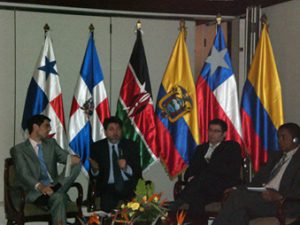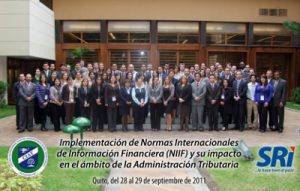Seminar on the implementation of International Financial Reporting Standards (IFRS) and its impact on the Tax Administration
Under the agreement between the SRI of Ecuador and CIAT, in the city of Quito was developed the first Latin American activity about the impact of IFRS in the field of tax administration.
As a result of a request by Mr. Carlos Marx Carrasco, Director-General of the Ecuadorian Internal Revenue Service, the CIAT Executive Secretariat together with the requesting tax administration have made enormous efforts to coordinate a historic activity which allowed to include on the tax administration international discussion agenda a topic as important as the analysis of the impacts that International Financial Reporting Standards (IFRS) presented on the tax laws and tax administration processes.
The aforementioned activity was held last September 28 and 29, 2011, and it opened with Mr. Miguel Acosta, Director of Fiscal Studies Center of SRI in Ecuador and Gonzalo Arias, CIAT International Cooperation Manager speeches. It also included over 100 officials from SRI in Ecuador, Mr. Bernard Marchant, Chile’s tax expert, Julio Piza, Colombian tax expert, and senior officials of the Public Accountants Association of Pichincha in Ecuador, the Superintendence of Companies of Ecuador, the Kenya Revenue Agency and the Internal Revenue in Dominican Republic.
During the course of the event, the experts have repeatedly stressed that from a business point of view, the implementation of IFRS is an opportunity to improve corporate governance, consistency in financial reporting at international level and the consequent reduction in costs that such standardization could generate.
Similarly, by way of conclusion, the importance of tax administrations to go with the process of implementation and regulation of IFRS in the country, to analyze the effects that IFRS can possibly generate on tax aspects, especially on those cases where the tax rules referred to the accounting rules; to provide permanent training to officials of the tax administrations and to coordinate actions with related organizations (professional associations, regulatory agencies, academics, etc.); to assess the possible impacts on aspects for the control of big enterprises and international taxation; to assess transaction costs for the tax administration and the taxpayer and thus, simplify processes for different segments of taxpayers reached by the IFRS, among other relevant aspects.
Since the implementation of IFRS could have an impact on tax aspects, CIAT considers essential that tax administrations of the member countries that have implemented the IFRS generate studies that would allow assessing the impact of these rules on fiscal policy and tax administration. This is why we consider appropriate to continue devoting efforts to the creation of areas for discussion among tax administrations, which will allow them to deal with complex or difficult issues and provide mutual cooperation to face the changes that IFRS presents in the best possible way.
See agenda of presentation
See Photo

Official Event Photo

Shown above are the speakers who participated in the Seminar on the implementation of International Financial Reporting Standards (IFRS) and its impact on the Tax Administration
